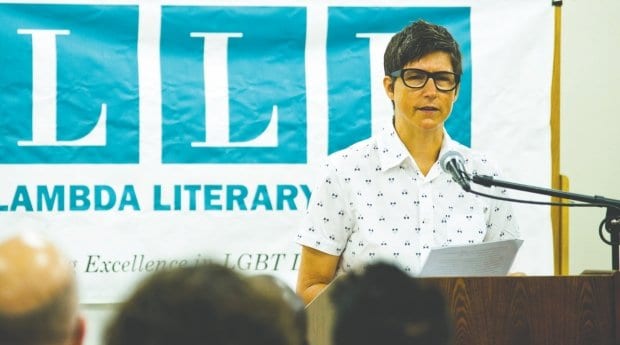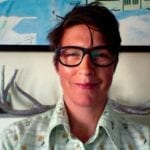On the first day, Jane from the fiction group warns that things will fall apart after a few days. A friend who attended the Lambda Literary Foundation’s Writers Retreat for Emerging LGBT Voices the year before has told Jane that by the third day, someone ended up in hospital. “What happened to them?” I ask. “Female trouble,” she replies, ominously, as we cross an empty parking lot toward the cafeteria.
I remember the email from the retreat organizers, which stated that due to the remoteness of the campus we should bring whatever we need — from warm clothes to tampons. Did she forget? And if so … what exactly happened? Female trouble could mean pregnancy, too — yet this is a gay retreat! It’s too confusing. I decide to cast last year’s drama from my mind and concentrate on setting, plot and character instead.
The Lambda retreat takes place at the American Jewish University, which is located in the Bel Air neighbourhood of Los Angeles, on Mulholland Drive. I look around for the woman in the red dress from David Lynch’s film but see only gardeners and nannies — watering lawns and caring for the children of silent, sun-drenched mansions. The campus sits on the side of a hill with Bel Air behind it and the 405 San Diego Freeway snaking its way through the valley below. Few of us have cars. Traffic drones steadily from the valley floor and police helicopters circle above. There is no way out.
We’re divided into groups: fiction, non-fiction, poetry and genre fiction. By the third day, everyone in fiction and poetry has cried after confronting the emotional core of their writing. I’m in genre fiction. No tears flow from my group; we are mostly writing about queer detectives solving queer mysteries. We are mostly laughing. The closest we get to tears is when we learn about royalties.
For some residents, another source of anguish is the cafeteria’s kosher food. By the fourth day, people are clicking on their GrubHub apps and ordering in. I find a woman from non-fiction in the photocopy room devouring a takeout container full of bacon.
We receive nametags stating which pronouns to use when addressing each other. I am assigned the pronoun she. “All right,” I think. “I can live with this.” Later, I learn that I am cisgendered, which means my gender matches my birth body. I check nametags carefully. Who wants to make a mistake, right?
Day six brings our readings, which are videotaped and posted online. What to read? What to wear? I can’t concentrate on my writing assignments. I am too worried about the first public reading of my queer mystery, Sharp in the Dark.
And then it’s my turn. I walk to the podium and launch into my story and suddenly remember how exhilarating it is to be onstage.
The readings are the only time alcohol appears on campus. After four days off the sauce, I stay up until 3am celebrating my two-minute reading with my new American friends. We plan visits, we set deadlines for our manuscripts, we agree to critique each other’s work — I don’t want my first gay writing retreat to end!
But it does. A black Town Car pulls up in front of my dormitory. The driver is wearing a red dress. Could this be Laura Harring, finally, from Mulholland Drive? I look for a nametag to do a quick pronoun check, then remember I am back in the real world now. Sadly.


 Why you can trust Xtra
Why you can trust Xtra


